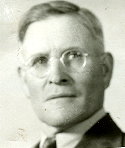
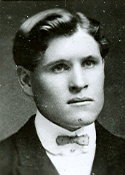 Dad was born on November 10, 1881, in a two-room adobe house on his grandfather’s ranch, where Jack Kimber now lives. He had a privilege that not too many people enjoy at birth. He was accompanied into this world by a twin sister, Ellen Kimber Toyn. These twins were born to Charles and Sarah Elizabeth Morgan Kimber, and the family eventually numbered nine children.
Dad was born on November 10, 1881, in a two-room adobe house on his grandfather’s ranch, where Jack Kimber now lives. He had a privilege that not too many people enjoy at birth. He was accompanied into this world by a twin sister, Ellen Kimber Toyn. These twins were born to Charles and Sarah Elizabeth Morgan Kimber, and the family eventually numbered nine children.
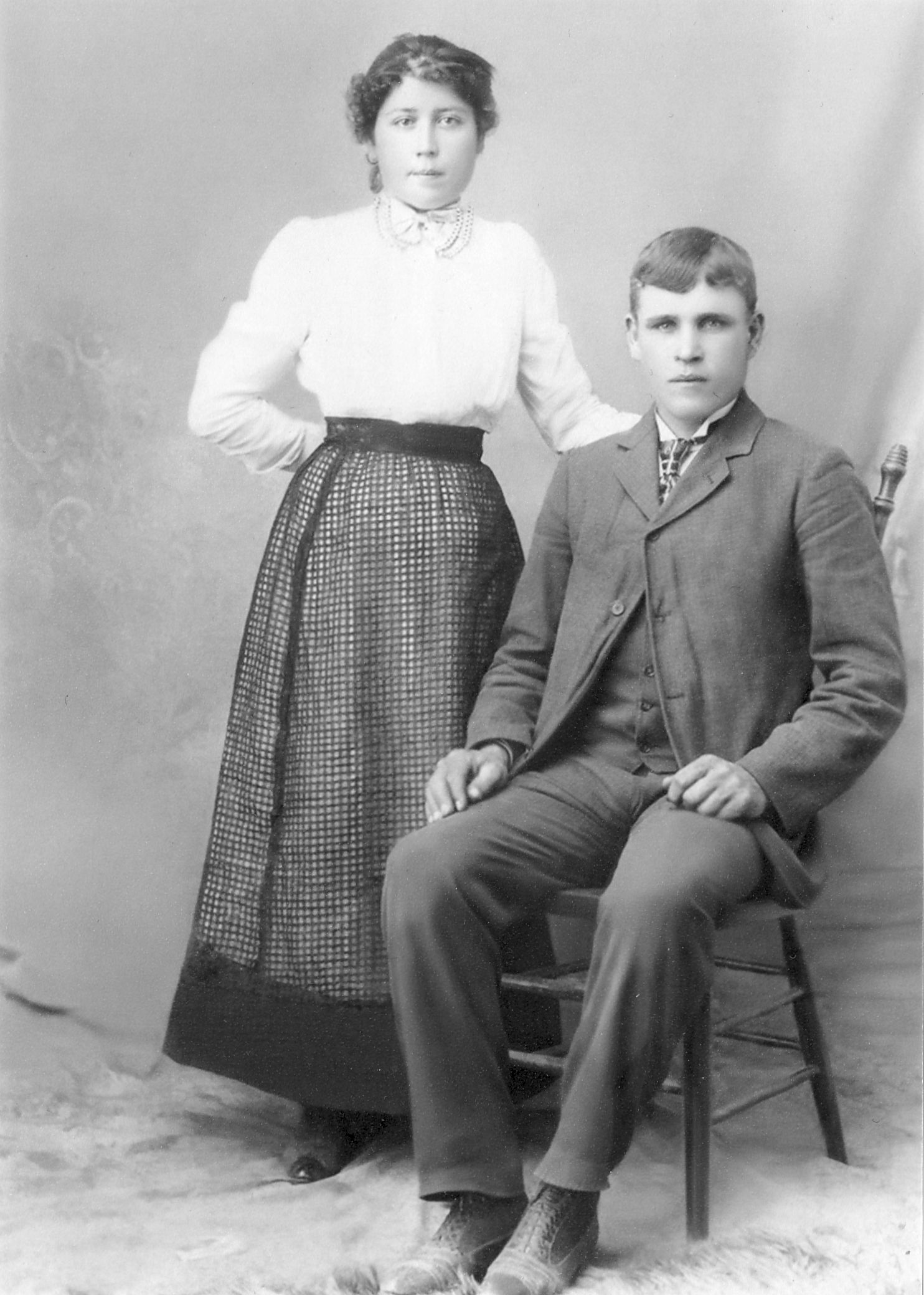
Ellen & Elmer Kimber 1900
He began his childhood in very modest circumstances. Settlers in the valley were trying to establish homes and had very few comforts. The family moved around quite a lot. At one time he lived in a one room house with a lean-to. He told us they had no wall in one side of the lean-to, just a quilt hung up to keep out the weather. This house was located on the place where Oren lives now. Dad went barefoot most of the time because he didn’t have shoes. He usually walked to school barefooted.
Dad remembered playing with Indian children under a big cedar tree on the hill by their home. One of the Indian boys, when grown up, got drunk and helped kill a man in Montello, Nevada. He was hung in Elko. Dad always felt sorry about that.
Dad remembered the early settlers danced a lot at different homes. Sometimes their only music was Bishop Toyn whistling and beating on a tin can, which was quite amusing to the younger folks.
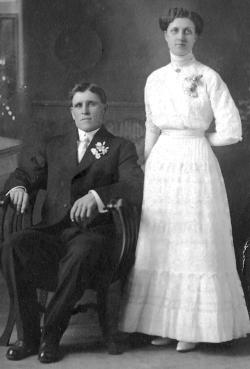
Elmer & Annie Kimber wedding 1911
Just before Dad’s eleventh birthday, his mother passed away, on October 26, 1892. The children were moved down to Grandfather Kimber’s ranch to live with their Aunt Lizzie.
Dad’s early life was hard. He found himself “on his own” at an early age, and had to make a living for himself. He worked at various jobs, including mining, working with sheep, working in the store at old Tacoma, Nevada, working on grain harvesting crews throughout the Northwest, and other odd jobs that became available. A lifetime of experience was packed into his teen years, because the necessity of making a living brought him into contact with people of all walks of life and placed him in circumstances both desirable and undesirable.
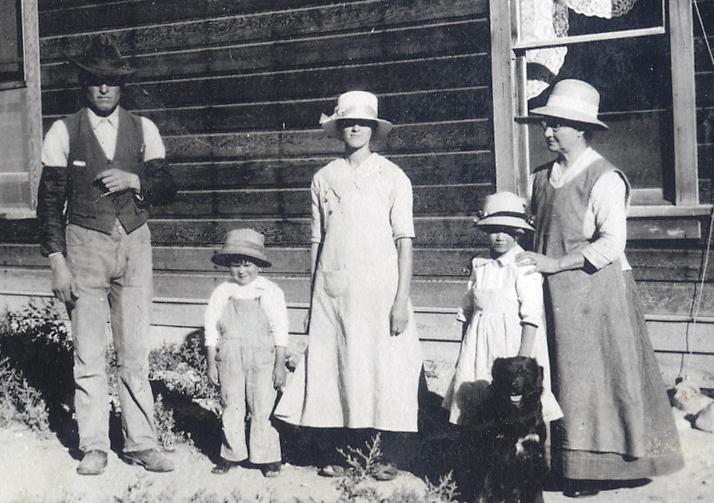
Elmer, Lyman, Annie, Emily Kimber & Mrs. Ballingham
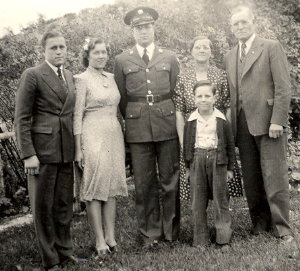
Rulon, Emily, Lyman, Annie, Elmer & Dennis Kimber
In those days, when couples got married, the young people of the community would come to their home and promise not to shivaree the young people if they would give a dance for the community. Dad remembered when his father married the second wife, Josephine Laird, the people came to the house, and a stranger was the leader of the group. He and Grandpa had an argument. The argument became louder and louder, and Dad and his brother, George, sneaked away and went to bed. They were pretty scared.
He completed the eighth grade at Brigham Young Academy. He had typhoid fever and was very ill while there at school. The lady he was boarding with nursed him back to health.
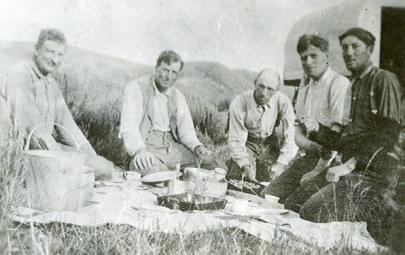
William (Bill) Cooke, Thomas Thomas, Martin Mecham, Elmer Kimber & Heber Simpson
Dad was later called to take a missionary course at Brigham Young Academy. He entered school in September 1902. In November 1902 Elder George Reynolds and Seymore B. Young interviewed the class of about 100 students for the purpose of calling missionaries. Soon after Dad was called to the Middle States Mission with headquarters in Cincinnati, Ohio. He left Salt Lake City on December 17, 1902.
Dad and his companion, Elder Johnson, had an interesting experience. All Elders were told not to go into Lewis County, where in 1884 Elders Biggs and Berry had been killed by a mob. During their travels Dad and his companion became lost, so when night came they asked to stay at the first house they came to. The man claimed to have entertained Golden Kimball and other missionaries. They were fed good meals and given a good bed. In the morning their host offered to show them where Elders Biggs and Berry had been murdered and buried. It was about one-half mile from the place where they had spent the night. Dad and his companion thought their host could have been a member of the mob. They were told this was true by members of the church who had accompanied B.H. Roberts on his dangerous trip to recover the bodies of the murdered Elders. Dad and his companion were happy to get away from this part of the country.
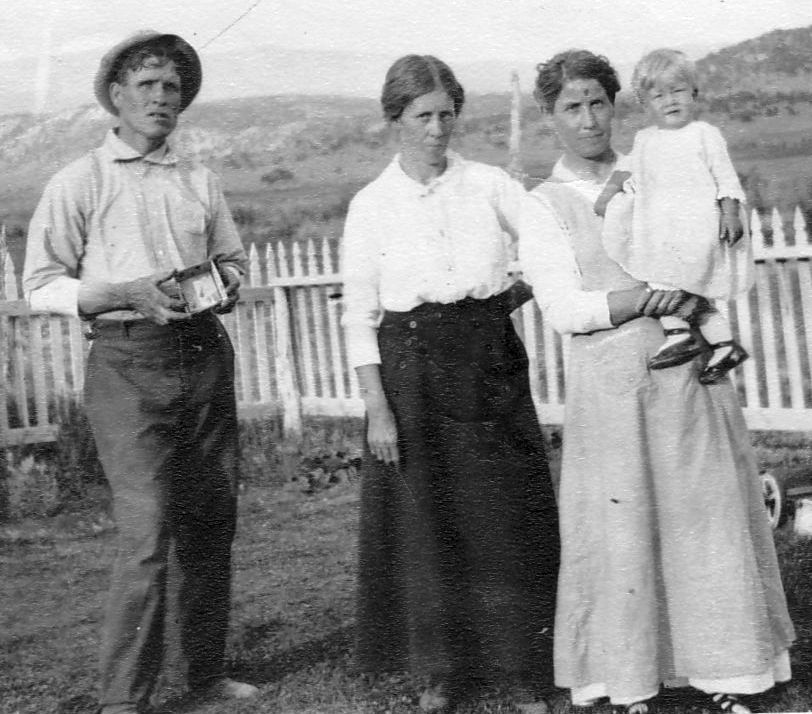
Elmer Kimber, Louie Roberts, Nell & Vern Roberts
Dad was conference president for a while. After serving two and one-half years in the mission field, Dad was given an honorable release and returned to Utah on July 2, 1905.
Soon after returning from his mission Dad became better acquainted with a young lady convert to the church, who had emigrated from England to Utah, with other members of her family and had taken up residence in Grouse Creek. Dad had known this young lady prior to his mission call, but was preoccupied with other matters at the time. However after returning from his mission he noticed what a beautiful lady Annie Ballingham had become, and they were married in the Salt Lake Temple on December 15, 1911.
They purchased a farm and range land in Grouse Creek, where they have since lived happily and enjoyed life. To this union were born four children: Emily, Lyman, Rulon, and Dennis. Rulon gave his life in World War II, in the Philippine Islands, where he was trying to save the life of his buddy.
He served many positions in the church. He served briefly in the Presidency of the Elders Quorum in the Raft River Stake. He has served as ward teacher and home teacher nearly all of his adult life. He has been a teacher in the Sunday school and MIA, as first counselor to Bishop John Hadfield for eleven years, as Bishop of the Grouse Creek Ward for fifteen years, as High Counselor in the Cassia Stake for many years until he was released on November 20, 1960. In the later years of his life he served as secretary to the High Priests Group, after it became difficult for him to move around and hold other positions.
His life was miraculously preserved on many occasions so that he might fulfill his life’s mission.
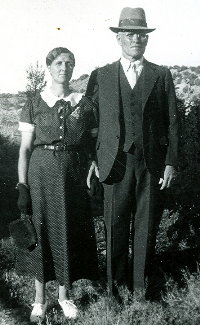
Annie & Elmer Kimber
Dad has enjoyed a long, full, rich life. He was worked hard to provide for his family, which has been the center of his life. His home has been a haven for family, neighbors, friends and travelers. He was never too busy to give a helping hand, wherever and whenever, it was needed, and he spent many hours comforting the sad and the weary and administering to the sick and the needy.
During the later years of his life, Dad was afflicted with arthritis, which became increasingly severe as the years came and went, but his affliction did not dampen his spirits nor lessen his zest for life, which he enjoyed to the utmost.
He had an unshakable faith in God and a burning testimony to the truthfulness of the Gospel. He did not hesitate to bear that testimony whenever and wherever the opportunity presented itself. Indeed, his very life was the strongest testimony he bore.
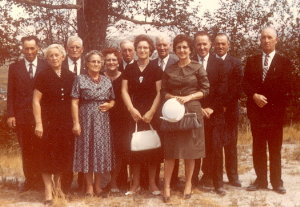
Raymond, Louisa Roberts, Elmer, Chloe Tanner, Elsie Smith, Rollo James (Jim), Vera Tanner, Osborne (OZ), Fern Shaw, Charles Junior, Edwin (Ted) and Winfred
Dad passed away Friday evening, November 2, 1973 and is buried in the Grouse Creek Cemetery. Surely he chose a righteous path and led the way. I hope we can follow his example.
The void which he leaves in our lives can never be filled, but the life he lived and the example he set for all to see is as a beacon set on a hill to guide all who pass this way and aid them in their crossing of the troublesome sea of life, that they may successfully complete their journey and be where I am sure he is–in the Celestial Kingdom of our Heavenly Father.

